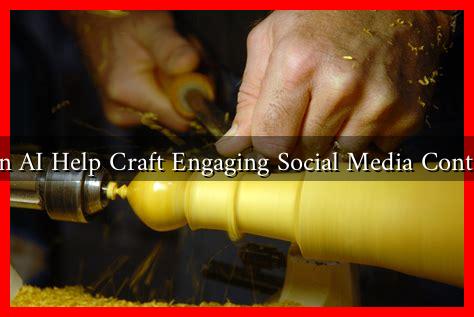-
Table of Contents
Can AI Help Craft Engaging Social Media Content?
In the fast-paced world of social media, creating engaging content is crucial for brands and individuals looking to capture attention and foster community. With the rise of artificial intelligence (AI), many are asking: can AI help craft this engaging content? The answer is a resounding yes. AI technologies are transforming how we create, curate, and distribute content, making it easier to connect with audiences in meaningful ways.
The Role of AI in Content Creation
AI has made significant strides in recent years, particularly in natural language processing (NLP) and machine learning. These advancements allow AI to analyze vast amounts of data, understand audience preferences, and generate content that resonates. Here are some ways AI is being utilized in social media content creation:
- Content Generation: AI tools like OpenAI’s GPT-3 can generate text that mimics human writing styles. This capability allows brands to produce blog posts, social media updates, and even ad copy quickly.
- Personalization: AI algorithms can analyze user behavior and preferences to tailor content specifically for different audience segments, increasing engagement rates.
- Trend Analysis: AI can sift through social media data to identify trending topics and hashtags, helping brands stay relevant and timely in their content strategies.
Case Studies: AI in Action
Several companies have successfully integrated AI into their social media strategies, yielding impressive results. Here are a few notable examples:
- BuzzFeed: The media company uses AI to analyze which types of content perform best on social media. By leveraging this data, they can create articles and quizzes that are more likely to go viral.
- Hootsuite: This social media management platform employs AI to suggest optimal posting times and content types based on audience engagement patterns, helping users maximize their reach.
- Canva: The graphic design tool uses AI to recommend design elements and layouts based on user preferences, making it easier for non-designers to create visually appealing social media posts.
Statistics That Speak Volumes
The impact of AI on social media content creation is backed by compelling statistics:
- According to a report by Statista, over 4.5 billion people use social media worldwide, making it a critical platform for brands.
- A study by HubSpot found that 54% of consumers want to see more video content from brands they support, highlighting the need for engaging multimedia content.
- Research from Social Media Examiner indicates that 73% of marketers believe that their efforts through social media marketing have been “somewhat effective” or “very effective” for their business.
Challenges and Considerations
While AI offers numerous benefits, there are challenges to consider:
- Quality Control: AI-generated content may lack the nuance and emotional depth that human writers provide. Brands must ensure that AI tools are used to enhance, not replace, human creativity.
- Ethical Concerns: The use of AI in content creation raises questions about authenticity and transparency. Brands must be cautious about how they present AI-generated content to their audiences.
- Over-Reliance: Relying too heavily on AI can lead to a lack of originality. It’s essential to strike a balance between AI assistance and human input.
Conclusion: The Future of AI in Social Media Content
AI is undoubtedly reshaping the landscape of social media content creation. By leveraging AI tools, brands can generate engaging, personalized content that resonates with their audiences. However, it is crucial to maintain a balance between AI and human creativity to ensure authenticity and emotional connection. As technology continues to evolve, the potential for AI in crafting social media content will only grow, making it an exciting area for marketers and content creators alike.
In summary, AI can significantly enhance the way we create and distribute social media content, but it should be viewed as a tool to complement human creativity rather than a replacement. Embracing this technology can lead to more effective engagement strategies and ultimately drive better results for brands in the digital space.

